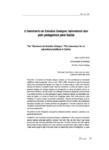| dc.contributor.author | Costa Rico, Antón | |
| dc.date.accessioned | 2011-11-18T12:59:45Z | |
| dc.date.available | 2011-11-18T12:59:45Z | |
| dc.date.issued | 2010 | |
| dc.identifier.citation | Sarmiento Anuario galego de historia da educación, 2010, 14: 27-49. ISSN: 1138-5863 | es_ES |
| dc.identifier.issn | 1138-5863 | |
| dc.identifier.uri | http://hdl.handle.net/2183/8472 | |
| dc.description.abstract | [Resumen] O Seminario de Estudos Galegos, fundado en 1923, constituiuse en importante plataforma cultural galeguista, entre os anos 1928 a 1936, momento no que foi clausurado polas novas autoridades franquistas. Con máis de 170 socios activos, o SEG abriu diversas parcelas de estudo da realidade social, histórica, económica, e cultural de Galicia, o que se expresou nalgúns moi notables traballos de investigación, en xeiras de difusión cultural, no intercambio científico e de información con entidades académicas españolas e internacionais e na edición de libros. No SEG participaron algúns profesores atentos á problemática educativa de Galicia, e a través da Sección de Pedagogía, desde 1933, desenvolveron varias iniciativas. É o que se analiza na presente contribución, situando as súas achegas, tanto no panorama das demandas de reforma educativa española, como no contexto das orientacións educativas trazadas pola corrente ideolóxica do galeguismo. A Sección poderia ter sido um Laboratório de pensamento educativo, pero de facto non chegou a selo, e procúranse aqui as oportunas explicacións. | |
| dc.description.abstract | [Abstract] The “Seminario de Estudos Galegos”, established in 1923, became an important cultural Galician nationalist platform, between 1928 and 1936, at which time it was closed down by the new Francoist authorities. With more than 170 active members, the SEG opened several fields of study related to the social, historical, economic and cultural reality in Galicia. These were brought to light in the wide variety of outstanding works of investigation, in areas of cultural diffusion, in the exchange of scientific knowledge and data with other national and international academic organizations and in the publication of books. Also participating in SEG were teachers interested in the educational problems in Galicia, and through the “Sección pedagógica” (Pedagogical department), began to develop a number of different initiatives as of 1933. This article presents an analysis of these facts, placing emphasis on contributions from the demands of educational reform in Spain and on the context of educational orientations laid down by Galician nationalist ideology. The “Sección” could have been a “Laboratorio de pensamento educativo” (laboratory of educational thinking) but this in fact did not occur. This article explores the pertinent explanations. | |
| dc.language.iso | glg | es_ES |
| dc.publisher | Universidade da Coruña | es_ES |
| dc.subject | Pedagoxía | es_ES |
| dc.subject | Galeguismo | es_ES |
| dc.subject | Realidade educativa | es_ES |
| dc.subject | Ideoloxía | es_ES |
| dc.subject | Propostas e programa de intervención | es_ES |
| dc.subject | Pedagogy | es_ES |
| dc.subject | Galician nationalism | es_ES |
| dc.subject | Educational reality | es_ES |
| dc.subject | Ideology | es_ES |
| dc.subject | Proposals and intervention program | es_ES |
| dc.title | O Seminario de Estudos Galegos: laboratorio dun plan pedagóxico para Galiza | es_ES |
| dc.title.alternative | The “Seminario de Estudos Galegos”: the laboratory for an educational platform in Galicia | |
| dc.type | info:eu-repo/semantics/article | es_ES |
| dc.rights.access | info:eu-repo/semantics/openAccess | |






